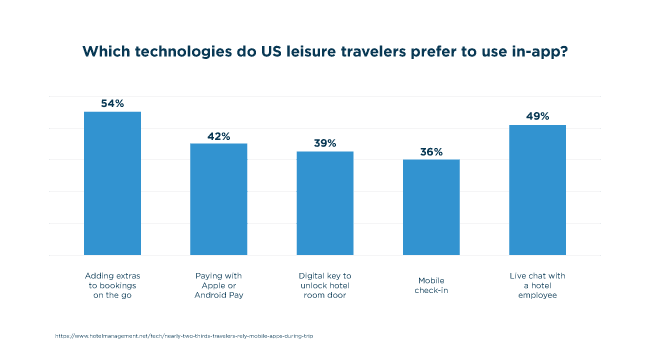
While travel has not returned to its pre-pandemic levels in some regions, there have been significant steps in recovery. Global vaccine rates have steadily increased and may regional lockdowns and restrictions have waned, both of which have helped ease potential travel anxiety.
The increase in travel demand is a positive development, but it should also be noted that the pandemic has shifted how consumers and travel companies operate in the market. Several technology trends have emerged and hospitality companies can position themselves for success by ensuring their tech stacks meet these new needs.
“Bleisure” is increasing in popularity
Working remotely trend has quickly shifted from being a workplace perk to being the norm. Since 2009, the number of remote workers has risen by 159%, a number that will likely continue to rise through COVID-19 recovery. This flexibility has contributed to the increase in “bleisure” travel, in which consumers mix business with leisure. To appeal to these travelers, it’s crucial that hotels have reliable high-speed internet available and a variety of places for travelers to connect – from restaurants to quiet lounges to business centers.
Hotels can also provide business-related value-adds like printing services, secondary monitors, and other computer equipment to ease some of the concerns that this new breed of traveler may have. But these investments don’t have to be limited to individuals booking stays. Some hotels are also experimenting with new technologies and coworking services. Hamilton Hotel offers a WFH: Work From Hamilton program, which provides locals with a quiet space to get work done while also providing the hotel with incremental revenue.
Travelers want more control of their experiences
Being able to personalize experiences is key for travelers, and hospitality companies can help consumers do just that. In addition to providing personalized, relevant offers – for example, sending amusement park coupons to family travelers – robust loyalty apps can give businesses an edge with customers. Modern booking engines and in-app messaging platforms are both key in improving customer experience, but the personalization doesn’t have to stop with hotel services. Being able to access streaming services while traveling is increasingly in demand, and Hilton found a solution for this by allowing travelers to tap into Netflix directly from the app, bringing a piece of home to the room.

Customers are more digital than ever
Digital has been a rising trend rise for several years, but with over 60% of the planet connected to the internet, it’s no longer a “nice to have.” The internet technology is inextricably linked to the lives of many people, and travelers are no exception. Being able to research destinations on demand is commonplace, and travel companies should ensure that they are meeting customers where they’re at.
- Social Media: Social media usage has exploded in the past decade and consumers are more engaged than ever. In fact, the average person visits 7 different social platforms each month. But social has become about more than sharing pictures of pets – it’s a powerful new way for users to conduct research and stay informed. With so much traffic on these sites, travel companies need to determine where their audiences are visiting and set up profiles on those platforms. This will allow your business to show up when users are researching solutions, and provides visitors with a way of reaching out when they have inquiries.
On the business side, social media offers companies several tools to help locate, educate, and reach out to customers. Nearly 80% of people share milestones on social, more than any other method, so if your brand is a part of those conversations, you’ll want to know. By searching your brand name on social sites, you’ll get an idea of what topics and concerns arise when people are thinking of you, allowing you to correct any negative experiences and improve customer service. Then, once you’ve gotten a grasp of what your customers are looking for from your brand, you can find run targeted advertisements to further enrich the relationships and bring in qualified leads.
- Virtual Reality: As the adage goes, sometimes seeing is believing, and improvements in virtual reality technology has made this easier to achieve. Consumers are becoming much more visual, with videos and images getting more engagement than their text counterparts. For travel companies, this trend presents a great opportunity to give travelers a view of different destinations to help pique their interest. Hotels can use companies like Matterport to create virtual tours of their locations, everything from rooms to restaurants to meeting areas. Agencies could also curate live streams – similar to the webcams provided by the National Park Service – so that travelers can get a view of the location in advance of booking.
- Location-Based Services: Location services are frequently used by hospitality companies to help travelers search for destinations. Now, companies are beginning to use the technology to help amplify customer experiences while at their destinations. Using staff management apps matches employees with customers when issues arise, minimizing the time between inquiry and resolution, which helps keep customers happy. But that is just the beginning. In the meeting and event space, for example, most attendees register with an event code to help segment them out. Pairing the code with location-based technology can be used to push notifications, event details, and updates to visitors within a certain location, giving them in-the-moment details that contribute to a smooth event experience.
Automation and AI are strategic differentiators
These days, more and more companies are being tasked with doing more with less, whether that means limited staff or less spend. Many travel employees are taking on new or expanded roles during recovery, but must do so without sacrificing customer service. Automation and AI can be a huge help in this regard.
- Chatbots: Some travel agencies have begun using chatbots on their websites to act as “virtual agents” for customers. These trending technology tools can be programmed to answer common questions, provide offers or recommendations, or even accept bookings. When there are questions that can’t be answered virtually, a live agent is brought on board to assist. For companies with limited staff, this sort of assistance can be a life saver.
- Smart technologies: In addition to IoT technologies, which are a great benefit for travelers, smart technology can help hotels save money. Energy management tools can help regulate when lights are used in certain rooms and what room temperature levels are most efficient, resulting in significant cost savings for hotels. Chatwal Hotel integrated smart technologies into their rooms and hallways, significantly lowered energy consumption, and saved nearly $125,000 in the first year alone.
Automation of commission processing and payments can also benefit travel companies. Hotels and agencies both thrive when business partners are consistent in processing complete and accurate commission payments. Onyx has several solutions that help tackle these tasks. CommPay pays out commissions on hoteliers’ behalf, while centralizing reporting and inquiry management. RecoverPro and SurePay streamline collection and allow agencies to receive payments in their chosen frequency and currency. These tools help simplify day-to-day management for travel companies, clearing up time for employees to focus on strategy and customer service.
